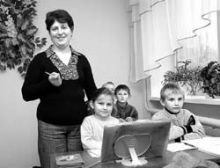The smell of freshly-cut boards dominates in the new school building in the village of Zalisoche, Volyn oblast. The principal, Svitlana Zbyrun, jokes that repairs here “have not stopped, they’re on hold.” She doesn’t hide her joy at having talked one of the sponsors, a local businessman, into paying for the tiles for the school cafeteria. Last summer this man, who once attended the school, also paid for two expensive school doors.
Zbyrun shares her experience of communicating with Ukraine’s rich and famous: “He told me, ‘Svitlana, that’s it, don’t bother visiting me again.’ I didn’t know him personally. I was brought to a bar that he owns. He agreed to help. Then he told me not to visit him again, so I didn’t. That’s how I’ve been living for the past couple of years, trying to figure out whom I can ask for help. Should I visit a place I went to a long time ago or some place where they still put up with me? That businessman came to see me recently. He was angry: ‘Why don’t you come to my office anymore? I’ll be able to help you many more times!’”
This past summer was hectic for the principal and the entire school, because the premises of a local construction office were being rebuilt. “Leontii Krychkevych, the head of the district state administration, called me into his office and said, ‘I’m going to help those who are working. We’re going to build a school!’ It was hard to believe because the building was in very poor condition, but it wasn’t that bad, come to think of it.”
Children used to study in this building, which is some way from the main structure. This was at the dawn of Ukrainian independence, when local construction workers found themselves out of a job, and the Olyka construction company ceased to exist. Its spacious office was converted into junior grade classrooms.
“Sixth-graders studied here, too. They had a bedroom, a playroom, and several classrooms. And there was a cafeteria,” says Zbyrun dreamily, as though recalling a happy dream. But then the central heaters broke down because the boiler room servicing the residential district stopped functioning. Several dozen children then returned to the “old school,” which was at full capacity. It is really surprising to find a secondary school with 153 pupils in a small village near Olyka. After all, this is not a school located in the backwaters of Polissia with its traditionally large families. There are schools with 125 pupils in Volyn, which is no surprise given the current demographic crisis. In this case, we have two small villages, Zalisoche and Horianivka, where there are not too many young people at first sight. However, 20 boys and girls went to school this year. There are 20 second-graders, 12 third-graders, and 22 fourth-graders. The secondary school in the neighboring village of Didychi has only a dozen more students — only because the students from Zalisoche enroll in Grade 10 here. Next year no children will be attending the school in the neighboring village of Lychany.
There are children from Olyka in the Zalisoche school. Residents traditionally refer to this village as a “town” — perhaps remembering the time when Olyka was the seat of the Radziwill dynasty. Not far from the ducal park, where only a few trees are left, stands a modern two-story school, a considerably younger and larger structure than the one in Zalisoche. The number of parents who annually enroll their children in this village school rather than in the “town” one is not diminishing. Why?
Nadia Dordiuk, the second grade teacher, says that seven out of the twenty children are from Olyka. Zbyrun diplomatically avoids commenting on the situation, saying it’s for the parents to decide. Be that as it may, the school in Zalisoche keeps winning local interschool academic competitions, even sports ones, even though the school has never had a gym.
“We’ve vacated two classrooms so that we could have a gym, although there’s so little space,” the school principal says, exasperated.
One of the school’s sponsors, a Volyn developer who was born in Horianivka, says that the premises of the former interfarm construction company’s boiler room should be renovated. Zbyrun is not sure, remembering the hardships she had to endure when the office was being renovated. The new premises are reminiscent of a provincial railroad station. There is a mirror and a button accordion on the floor in the teachers’ room; there is no way to hang curtains because the expensive wallpaper is peeling off owing to the excessive humidity.
This structure has been without windows and doors for the last 14 years. It was restored by the local authorities, sponsors, parents, and teachers — the latter did the filling and wall painting. Today there are more pupils in the junior grades in Zalisoche than in grades five to nine. Everybody has to use the outhouse behind the school. They say that a capable landowner starts developing precisely from this place — in our case it is the other way around, as usual. Parents are especially worried about keeping the school warm in winter. There is an old boiler, and people in the know say that it won’t work when the temperature drops below 10 °C. On Sept. 1, when the school was launched with pomp, with singing, and television cameras filming, they promised to install an electric boiler. Nothing has happened.
Apart from heating, the parents are concerned about the school cafeteria. There isn’t one. That’s what the boards that are carefully stacked in the corridor are for. There is a lot of work left to be done here. The wiring was replaced recently, and an electric stove was thrown out after being unused for 14 years.
For the time being, the children have to make do with cookies and waffles. We happened to visit during a break, when the businesswoman entrusted with feeding the children was dispensing waffles. Waffles yesterday, waffles today, waffles tomorrow. Children get sick and tired of such a monotonous diet. What about the older pupils? The school budget has money for funding hot meals. The school principal spreads her hands in frustration. One of the recommendations of a recent inspection suggested that the teachers serve the pupils sandwiches and tea, as a way of solving the hot meal problem. Where will they rinse the cups? Well, let the children bring cups from home. The teachers would be glad to serve tea, but where? In some of the classrooms the desks are uneven, and the child might spill hot tea on themselves.
“We listened to the inspectors and nodded in agreement because no objections would be accepted anyway. We knew that the school principal would be the scapegoat anyway, and she was,” the teachers said.








